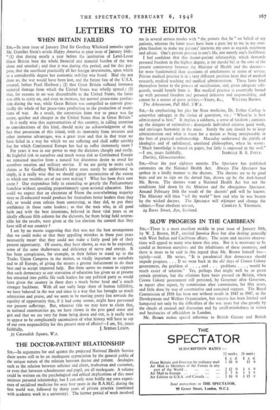LETTERS TO
THE EDITOR
WHEN BRITAIN FAILED
StR,—In your issue of January 23rd Sir Geoffrey Whiskard remarks upon Mr. Gunther Stein's article Happy America in your issue of January 16th: " (1) that during nearly a year before the institution of Lend-Lease Great Britain bore the whole financial and material burden of the war alone and unaided ; and that it was during this period, and for this pur- pose, that she sacrificed practically all her foreign investments, upon which to a considerable degree her economic stability was based. Had she not done so, the war would have been lost, and the future fate of the U.S.A. assured, before Pearl Harbour ; (2) that Great Britain suffered immense material damage from which the United States was wholly spared ; (3) that, for reasons in no way discreditable to the United States, the latter was able to carry on, and even to increase, her normal peace-time produc- tion during the war, while Great Britain was compelled to convert prac- tically the whole of her peace-time production to the production of muni- tions of war. As a result, the conversion from war to peace was far easier, quicker and cheaper in the United States than in Great Britain."
Is it really wise that representatives of this country, in calling attention to considerations of this kind, should make no acknowledgment of the fact that possession of this island, with its immunity from invasion and other immense advantages, was a great trust and that in that trust we have failed in a way for which we are suffering and shall suffer terribly but for which Continental Europe has had to suffer immensely more ?
For years it was in our power to stop the dictators cheaply and easily. At frightful risk to ourselves and much worse risk to Continental Europe we remained inactive from a natural but disastrous desire to avoid for ourselves taxation and military service. If we are going to make such claims as Sir Geoffrey Whiskard's letter must surely be understood to imply, is it really wise that we should appear unconscious of the extent to which our troubles are of our own making ? What has been their root cause ? Our stupendous folly in extending so greatly the Parliamentary franchise without spending proportionately upon national education. How could we expect that an electorate of ?vhom the ovexwhelming majority were so ill-educated would produce for themselves better leaders than they did, or would even refrain from continuing, as they did, to put their confidence in those same leaders ; so that the men who, in all good faith and with the best intentions, behaved in those vital years as an ideally efficient fifth column for the dictators, far from being held respon- sible for the results, were given at the last election the control that they have still of our country ?
I am by no means suggesting that that was not the best arrangement that we could make or that their appalling mistakes in those past years necessarily mean' that they could not make a fairly good job of their present opportunity. Of course, they have shown, as was to be expected, some of the same shallowness and deficiency of nerve and energy. It has been conspicuous, for example, in their failure to stand up to the Trades Union Congress in the matter, so vitally important to ourselves and to all Europe, of giving the miners a greater inducement to do their best and to accept imported help. But there seems no reason to suppose that such democracy as our starvation of education has given us at present has attracted into public life such leaders for any political party as would have given the country in these days a much better head and 'a much stronger backbone. With all our sadly large share of human fallibility, we.have behaved in the war and since in a way that has brought us much admiration and praise, and we seem to be moving pretty fast towards the equality of opportunity that, if it had come sooner, might have prevented our present sufferings. But, whatever title we may have to claim that, as national communities go, we have shown in the past good sense and grit and that we are very far from being down and out, is it really wise to appear to be complacently unconscious of what history will have to say of our own responsibility for this present state of affairs?—I am, Sir, yours






























 Previous page
Previous page